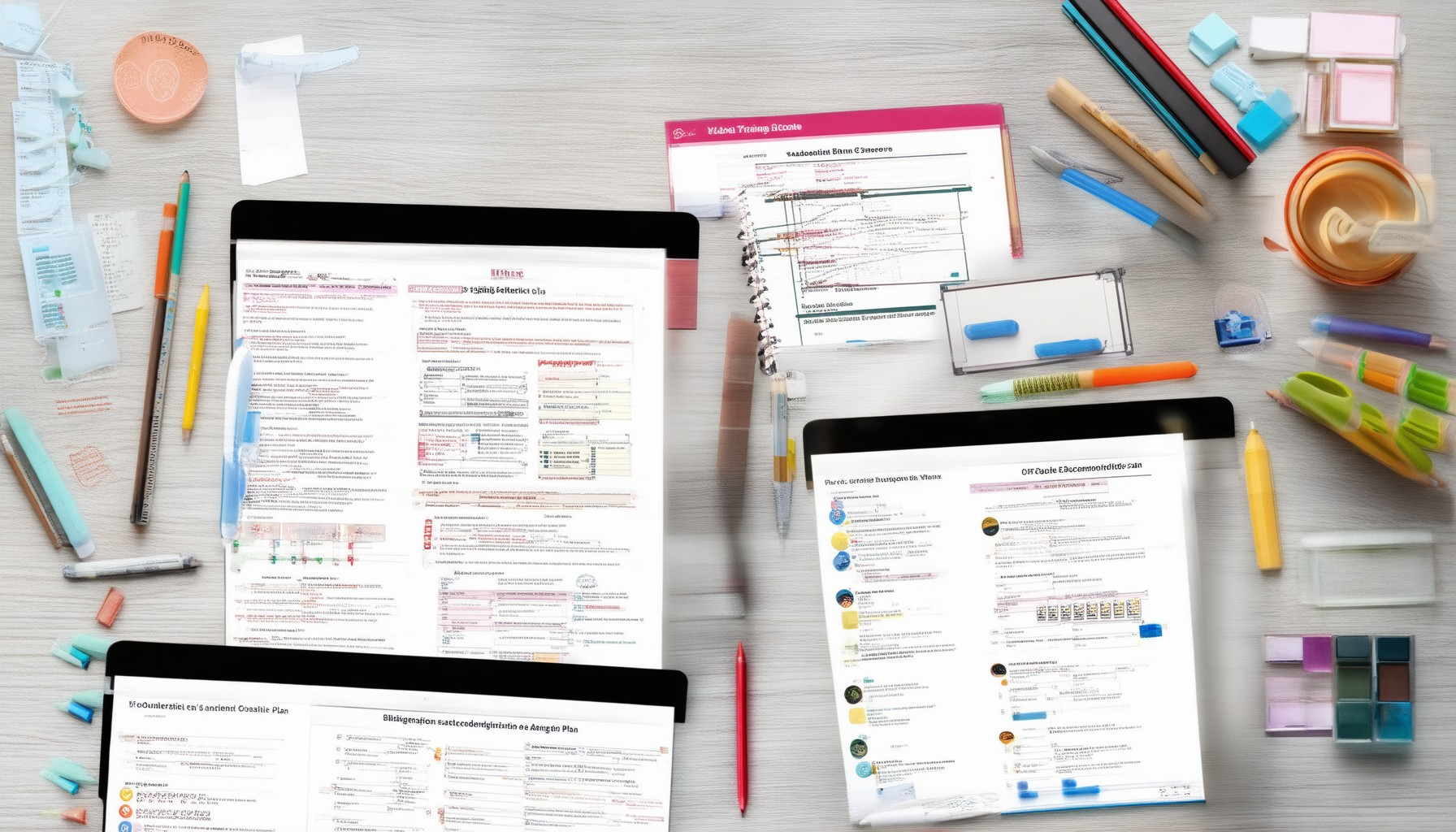Planning for academic success is a crucial step in higher education, ensuring students stay organized, meet deadlines, and achieve their goals. With the right tools, academic planning becomes streamlined and effective, allowing students to navigate their educational journey with confidence. Whether you’re a high school student transitioning to college or a working professional pursuing further studies, having a structured academic plan is essential. This guide explores the best tools and strategies to create a comprehensive academic plan, helping you stay on track from day one.
Key Takeaways
- Clarity on your academic focus ensures aligned goals and a structured path forward.
- Setting clear, achievable goals helps you stay motivated and measure progress effectively.
- Developing effective strategies for course selection, time management, and study techniques boosts academic performance.
- Staying adaptable allows you to navigate changes and challenges in your academic journey.
- Leveraging resources wisely maximizes your academic potential through university support and external tools.
- Curriculum alignment ensures academic programs meet institutional missions and student needs.
- Regular program evaluation guarantees continuous improvement and relevance.
- Proactive resource allocation supports faculty, facilities, and funding for academic success.
- Engaging stakeholders fosters collaboration and shared understanding.
- Balanced academic planning combines strategic thinking with practical execution.
- Structured study habits enhance focus and efficiency, leading to better results.
- Active learning techniques deepen comprehension and retention.
- Effective time management reduces stress and increases productivity.
- Seeking support networks provides guidance and resources for overcoming challenges.
- Prioritizing well-being maintains cognitive sharpness and overall health.
- Continuous reflection leads to adjustments and improvements in your plan.
What Are the 4 Steps in the Academic Plan?
To successfully navigate your academic journey, it’s essential to follow a well-structured plan. Below are the four key steps to guide you through your academic endeavors:
1. Consult with an Academic Advisor
Your academic advisor plays a pivotal role in helping you choose courses, understand requirements, and develop a personalized plan. Schedule regular meetings to stay on track and gain insights into potential challenges.
2. Choose Your Major Early
Deciding on your major early allows you to align your coursework with your career goals. Research thoroughly, explore electives, and seek advice to ensure your choice supports your long-term aspirations.
3. Plan Your Course Schedule Strategically
Organize your classes to balance workload and deadlines. Consider class times, exam schedules, and extracurricular commitments to create a manageable routine that minimizes stress.
4. Monitor Progress and Adjust as Needed
Regularly assess your academic performance and adjust your plan accordingly. Seek support when needed and stay proactive in addressing any issues that may arise during your academic journey.
By following these steps, you can effectively manage your academic responsibilities and work towards achieving your goals. For additional resources and tips, visit Enroll Maven to discover strategies for academic success.
How to Do Academic Planning
To effectively plan your academic journey, follow these organized steps:
- Set Clear Goals
- Define your short-term and long-term objectives. Whether it’s excelling in subjects or preparing for college, having clear goals helps you stay focused.
- Learn more about setting effective academic goals.
-
Create a Study Schedule
- Allocate specific times for studying each subject. Consistency is key to mastering complex topics.
- Discover time management techniques for better study efficiency.
-
Stay Organized with Tools
- Use planners or digital tools to track assignments, exams, and deadlines. Organization reduces stress and ensures nothing is overlooked.
- Explore best academic planning tools available online.
-
Seek Support Networks
- Join study groups or forums to exchange ideas and get feedback. Collaborating with peers can enhance your learning experience.
- Connect with mentors or teachers who can offer guidance and support.
-
Monitor Progress Regularly
- Periodically review your progress to adjust your plans as needed. Understanding your strengths and weaknesses early allows for timely corrections.
- Assess your academic performance and make adjustments to stay on track.
-
Stay Informed About Resources
- Utilize university or school resources like libraries, counseling services, and workshops. These can provide additional support and opportunities for growth.
- Explore available academic resources to aid your success.
By following these steps, you can create a structured and effective academic plan tailored to your needs. Remember, consistency and adaptability are crucial for achieving your academic goals.
What is an Academic Planner?
An academic planner is a comprehensive organizational tool designed to assist students, educators, and academic institutions in effectively managing and organizing their educational activities throughout the academic year. It serves as a centralized platform to streamline scheduling, task management, and resource allocation, ensuring productivity and efficiency.
Key Features of an Academic Planner
- Course Management: Organize course schedules, syllabi, and class timings in a structured manner.
- Assignment Tracking: Create and monitor assignment deadlines, progress, and submission statuses.
- Exam Preparation: Plan and track exam dates, study materials, and revision timelines.
- Extracurricular Activities: Manage clubs, societies, and other non-academic commitments efficiently.
- Time Management Tools: Utilize planners, calendars, and reminders to stay on top of daily tasks and long-term goals.
Purpose of an Academic Planner
The primary purpose of an academic planner is to enhance organization and productivity. By centralizing all academic-related tasks, users can reduce stress, minimize procrastination, and improve overall academic performance. It also aids in decision-making regarding resource allocation and prioritization of tasks.
Benefits of Using an Academic Planner
- Improved Time Management: Helps in allocating time effectively for studies, social life, and personal development.
- Reduced Stress Levels: Minimizes last-minute rushes and anxiety associated with upcoming deadlines.
- Better Communication: Facilitates coordination between students, teachers, and parents regarding academic schedules.
- Enhanced Productivity: Ensures that users can focus on their studies and perform at their best.
How Does an Academic Planner Work?
Academic planners typically work by allowing users to input their schedule details, which are then organized into a visual timeline. Features like drag-and-drop functionality, customizable templates, and alerts for upcoming events make them user-friendly. Some planners integrate with other tools like digital calendars and grading systems for added convenience.
Conclusion
In summary, an academic planner is a valuable asset for anyone involved in education. It provides a structured approach to managing the complexities of academic life, helping users achieve their goals and succeed in their pursuits. By leveraging the features of a good academic planner, individuals can optimize their time and efforts, leading to better academic outcomes and a more balanced lifestyle.
What Does an Academic Plan Look Like?
An academic plan is a structured approach to organizing and managing your education, often encompassing your short-term and long-term goals. Below is a breakdown of its key components:
1. Define Your Focus of Study
- Identify your primary field of interest. Whether it’s science, literature, business, or another discipline, clarity about your area of study is crucial.
- Consider minors or electives that complement your major or align with your career aspirations.
2. Outline Academic Goals
- Set specific objectives for each semester or year. Examples include earning a certain GPA, completing particular coursework, or preparing for exams.
- Create a timeline for achieving these goals, ensuring alignment with degree requirements.
3. Develop Strategies for Success
- a. Course Selection
- Choose courses that challenge you and contribute to your overall development.
- Balance core requirements with electives that spark your interest or prepare you for future opportunities.
-
b. Time Management
- Create a weekly schedule that allocates time for studying, attending classes, and relaxing.
- Use tools like planners or digital calendars to stay organized.
-
c. Study Techniques
- Employ effective study methods such as active reading, note-taking, and regular review sessions.
- Join study groups or seek tutoring assistance when needed.
-
d. Professional Development
- Engage in activities like internships, research projects, or presentations to build experience.
- Network with professors, peers, and professionals in your field.
4. Stay Flexible and Adapt
- Be open to changes in your academic path due to new interests or emerging opportunities.
- Seek support from advisors, mentors, or academic services when facing challenges.
5. Utilize Resources
- Leverage university resources such as libraries, labs, and counseling services.
- Explore online platforms like Enroll Maven for additional tips and guides.
By organizing your academic journey thoughtfully, you can maximize your potential and stay on track toward achieving your educational and career goals.
What is an Academic Program Plan?
An academic program plan is a strategic document that outlines the goals, objectives, and actions for achieving academic excellence within a college or university. It serves as a roadmap for meeting the institution’s mission and aligning its academic offerings with student needs and societal demands.
Key Components of an Academic Program Plan
- Curriculum Development : Designing and planning the courses, degrees, and specializations that align with the institution’s mission and market demands.
- Program Assessment : Regularly evaluating the effectiveness of existing programs to ensure they meet educational outcomes and student expectations.
- Resource Allocation : Determining the necessary resources, such as faculty, facilities, and funding, required to support the academic programs.
- Communication and Collaboration : Facilitating dialogue among various stakeholders, including faculty, students, and administrators, to ensure shared understanding and alignment.
Importance of Academic Program Plans
- Strategic Alignment : Ensures that the institution’s academic initiatives support its broader strategic goals.
- Student Success : By focusing on relevant and high-quality programs, academic plans contribute to student achievement and satisfaction.
- Adaptability : Allows institutions to respond to changing educational demands, technological advancements, and economic shifts.
Steps to Develop a Successful Academic Program Plan
- Define Goals : Establish clear, measurable objectives aligned with the institution’s mission and long-term vision.
- Gather Input : Engage stakeholders through surveys, focus groups, and meetings to identify strengths, weaknesses, and opportunities.
- Allocate Resources : Secure the necessary human, financial, and material resources to execute the plan effectively.
- Implement and Monitor : Launch the planned programs and continuously evaluate their progress and impact.
- Evaluate and Adjust : Use feedback and performance data to refine and improve the academic offerings over time.
Example Scenarios
Academic program plans are often tailored to specific contexts. For instance, a university might design programs responsive to regional workforce needs, or a college might introduce interdisciplinary studies to cater to emerging fields like data science or sustainability.
By thoughtfully developing and executing academic program plans, institutions can foster innovation, enhance student experiences, and drive institutional success.
How to Create an Academic Success Plan
To create an effective academic success plan, follow these organized steps:
- Set Clear, Achievable Goals
Begin by defining your immediate and long-term objectives. Break down larger goals into smaller, manageable tasks to avoid feeling overwhelmed. For example, aim to complete a chapter per week or master a concept in two weeks. - Develop a Study Schedule
Allocate specific times for studying each subject. Use techniques like the Pomodoro Technique (25 minutes of study followed by a 5-minute break) to maximize focus and efficiency. Flexibility is key—choose a time when you’re most alert and free from distractions. - Organize Your Notes and Materials
Keep all necessary resources in one place. Use digital tools like Evernote or OneNote to store lecture notes, assignments, and study guides. Label folders or notebooks clearly to make retrieval easier. - Leverage Active Learning Techniques
Engage with the material actively. Summarize key points, teach concepts to yourself, or discuss ideas with peers. This enhances comprehension and retention. - Prioritize and Manage Time Effectively
Use tools like to-do lists or calendars to organize tasks. Categorize tasks by urgency and importance to focus on high-priority areas first. Avoid procrastination by setting realistic deadlines. - Stay Connected and Seek Support
Join study groups or forums to share ideas and get feedback. Discuss challenges with professors, advisors, or mentors who can offer guidance and resources. - Balance Academics with Well-Being
Regular exercise, adequate sleep, and a healthy diet contribute to cognitive function. Incorporate breaks and relaxation activities into your routine to maintain mental sharpness. - Reflect and Adjust Regularly
Periodically review your progress. Identify what’s working and what isn’t. Adjust your plan as needed to stay aligned with your goals.
By following this structured approach, you can create a personalized academic success plan tailored to your unique needs and preferences.









0 Comments